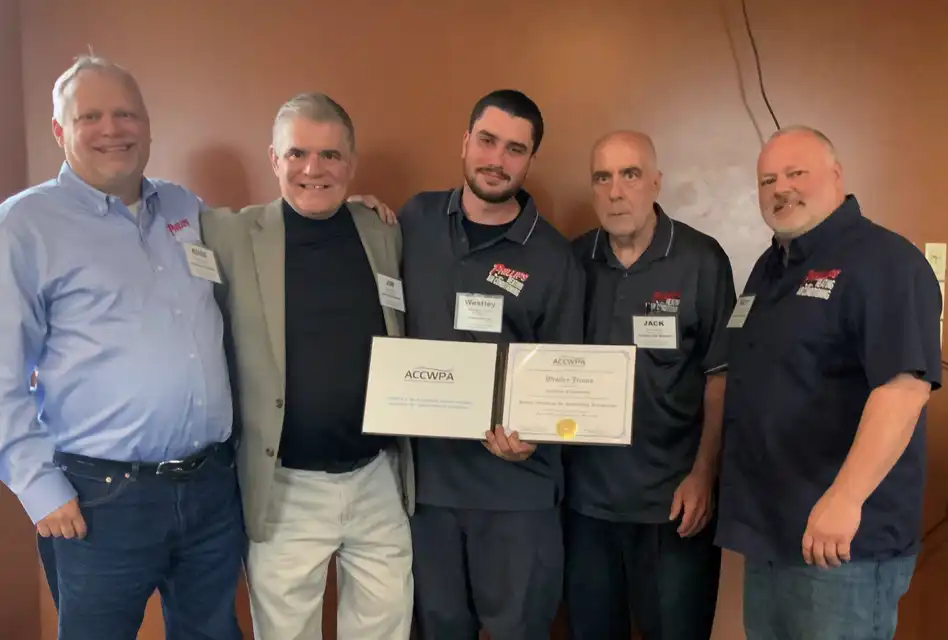What Could Possibly Go Wrong with Using a Non-Certified HVAC Contractor?
It’s certainly no secret that HVAC systems can be expensive. Installing a new HVAC system is an out-and-out investment and repair, replacement and maintenance services can also cost a pretty penny. For that reason, many homeowners in the Pittsburgh region might feel tempted to cut costs by hiring an unlicensed or uncertified HVAC contractor.
If this is okay, why do people still argue you should hire only a licensed or certified HVAC contractor? They’re all equally skilled and reputable, right? You should probably go with the cheapest quote, regardless of licensing or certification.
Sound good to you? It shouldn’t!
Of course, it’s only natural to want your home repairs done as economically as possible, but given the high cost of repairing today’s advanced, computerized HVAC systems, the money saved by hiring and unlicensed or non-certified contractor can end up costing you more in the long run. Fact is, their work comes with a number of risks and hidden costs, including shoddy craftsmanship, voided warranties, liability issues, safety hazards and more.
As a NATE-certified and fully insured HVAC contractor in the Pittsburgh area, the technicians at Phillips Heating & Air Conditioning are often called to homes where a system has failed.
Frequently, after looking the system over, it’s easy to see that the previous work was performed by an unlicensed or non-certified worker.
Sometimes, the homeowner can’t track down the person responsible and calls us in exasperation. Other times, the owner has previously attempted to get a repair reimbursed by the manufacturer, only to be told it was not installed by a licensed or certified contractor which voids the manufacturer’s warranty.
What sayeth the law? Before proceeding, however, it’s important to review Pennsylvania’s licensing and insurance requirements for contractors, including those in the HVAC business.
The Pennsylvania Home Improvement Consumer Protection Act (HICPA) states that all contractors who perform $5,000 or more in home improvements annually must register with the Pennsylvania Office of the Attorney General. Such contractors must re-register every two years.
However (and this is important), the state of Pennsylvania has no requirements directly relating to the certification or licensure of contractors involved in business, including HVAC. Consequently, Pennsylvania is one of the rather small number of states that do NOT, for example, require state certification or a license to perform work as an HVAC contractor.
A number of Pennsylvania’s 2,500+ municipalities, nevertheless, have instituted local licensure or certification requirements for HVAC contractors. But there are no records concerning those municipalities that have created licensure or certification requirements. The information can only be obtained by contacting the municipality where the work will occur.
*For clarity, we will simply refer to certified or non-certified HVAC contractors from here on, since the state does not require any type of formal certification or licensing. Plus, we won’t go so far as to identify any municipalities that have created licensing or certification requirements. Our intent is to tell you why you shouldn’t use an HVAC contractor that’s not qualified.
Risks of hiring non-certified contractors
Remember, anyone can work on your HVAC systems if the state does not require licensing or certification.
Shoddy craftsmanship.
Keep in mind that familiar phrase “you get what you pay for.” There’s no guarantee that you’re going to get the job done the way you want if you hire a non-certified technician. Only a professional certified HVAC contractor has the skills essential to get the job done the way you deserve. A non-certified contractor’s cheaper rates could be indicative of shoddy craftsmanship which can lead to bigger and more expensive problems down the road.
Of course, there are no guarantees that a certified contractor’s work will be any better than that of a non-certified contractor. However, a certified contractor will be protected by liability insurance and legally enforceable contracts called bonds. Bonding is often confused with insurance, but there is a notable differenced. A bond is intended to act as a guarantee that the contractor will perform the work as he or she is supposed to. It’s secured money that would be distributed to the homeowner in the event the contractor failed to perform as he or she would. The bond and contractor’s liability insurance both exist to cover you in the instance that the work is done unsatisfactorily.
Inferior HVAC systems.
Having non-certified technicians working on your HVAC system puts you at risk of having a questionable heating or cooling system in your home. As we’ve mentioned, an HVAC system is an investment! And you want to be assured that you have a great team installing your system or you’ll likely have to put up with open-ended repair services and a variety of setbacks.
Voided warranties.
It’s a little-known secret that if you have your HVAC equipment installed or serviced by a non-certified technician, the warranty on your equipment might be void. Such contractors cannot perform warranty work unless the manufacturer has agreed in writing to let a specific person do the work. Unfortunately, most consumers, even those who’ve done their research before purchasing an HVAC system, aren’t aware of this fact because it’s rarely disclosed by non-certified contractors. Plus, there is usually no notice about this on the manufacturer’s website, the packaging or on the equipment itself.
Be wary, too, because some certified contractors might sub the work to a non-certified crew. Ask for proof of certification and make sure the person performing the work is the person who is listed as being certified.
Liability issues.
If a non-certified contractor hasn’t bothered to get proper certification, they probably don’t have liability insurance or workers’ compensation either.
Here’s another little secret: If you don’t employ an insured contractor to handle your project, you’re the general contractor. So, if a worker gets hurt and can’t work for a couple of years, and there’s no workers’ compensation, you could be on the hook for medical bills and lost wages.
Oft times, you might hire a non-certified contractor not just because they are cheaper, but because they’re someone you know, such as a family member, neighbor or friend. Non-certified contractors are also known to gain work through referrals from these same groups of people as well.
Hiring friends or relatives as non-certified contractors doesn’t make the liability and risk issues go away either.
Anyone can enter an arrangement with the best of intentions, but when your buddy or nephew is injured while working on your furnace and files a claim with their insurance company, the company may well pay the claim and then go after you in subrogation proceedings (that’s where insurance companies fight to get reimbursed after paying their customers’ claims).
Unfortunately, many people assume their homeowner’s insurance will cover them in an instance where an uninsured contractor is injured on the job, however, this usually isn’t the case, unless you might have added coverage for in-home employees in your policy.
Your property value could be hurt if you hire a non-certified contractor.
You read that correctly – using a non-certified contractor can actually hurt your home’s property value. How? Let’s say your non-certified contractor had to cut corners to complete the project. Where a permit is required for a specific project, a certified contractor will always make sure to attain them while a non-certified firm will often skip this step. Since the proper permits weren’t acquired, it could ultimately impact your overall property value.
This could become an issue if you ever decide to sell your home, as you’ll be required to disclose certain information to your buyers.
Safety hazards.
Shoddy craftsmanship affects everything. It affects your family’s comfort, it affects your budget and it also affects the health and safety of you and your family. An undetected gas leak inadvertently caused by a lackluster team could result in carbon monoxide poisoning or (in extreme cases) even death! Keep you and your family safe by hiring a certified professional.
Red flags of a non-certified HVAC contractor
No proof of insurance.
As we’ve just seen, one of the most important things you want to make sure your contractor has is liability and workers’ compensation insurance. When working on an HVAC project, there are obvious dangers and you don’t want to be held liable as a homeowner if anything happens to go wrong. You don’t want to be the one to foot the bill if the company was negligent in obtaining insurance for its employees.
Advanced payment or cash.
If you’re being asked to pay a rather hefty down payment prior to any work being performed, you might want to tread lightly. For most projects, you shouldn’t have to pay more than 30 percent of the total bill in advance. In fact, many certified contractors will not ask for a significant amount of money until the job is finished and you’re satisfied. Also, if you’re asked to pay in cash or write a check to an individual’s name and not the company, you should realize that maybe something’s up.
Lack of references.
Just as any employer checks references of a potential employee, you should also check references before hiring an HVAC contractor. Ask for references or check with your local business bureau to see if any complaints have been lodged about the company. If they can’t provide any references, then you might want to so some additional research to find out if they are a legitimate business.
HVAC company intangibles
So, what to do if all local companies are fully certified and all have mostly positive reviews given by past customers. There are some intangibles that could help make the decision easier. Some things to consider might include:
- Customer service. Does the business answer your calls right away and do they have a good demeanor? Since these people will be in your home, it doesn’t hurt having a contractor skilled in the value of customer service.
- Free estimates. Quality companies will generally come to your home and give a free quote on what repairs are needed.
- With HVAC units, there’s generally an A, B and sometimes C route to take in getting your system back up and running. Beware of the company who only tries to sell you new equipment (although sometimes it may be the only remedy).
- Generally, the sooner the company can get in to fix your HVAC problem, the better, but unfortunately, a quality company can simply be too busy. In some instances, “first come, first served” will have to be the approach to take.
Bottom line: You should never hire a non-certified contractor.
HVAC technicians, in particular, are required to go through rigorous training to receive proper certifications. If you hire someone who doesn’t have the necessary accreditation, you can’t be sure that any installations, repairs or inspections are done correctly. Ultimately, this will lead to headaches and loss of money in the long run. More importantly, your HVAC system must always be maintained by a skilled professional to ensure it’s functioning safely and efficiently.
At Phillips Heating & Air Conditioning, we have trained our NATE-certified technicians to address as many questions and concerns as possible to help homeowners feel comfortable using our company as their HVAC contractor.
While it’s true that money can be the reason some homeowners choose a non-certified contractor, our feeling is that with the proper information, many homeowners will realize there is more to it than money.







